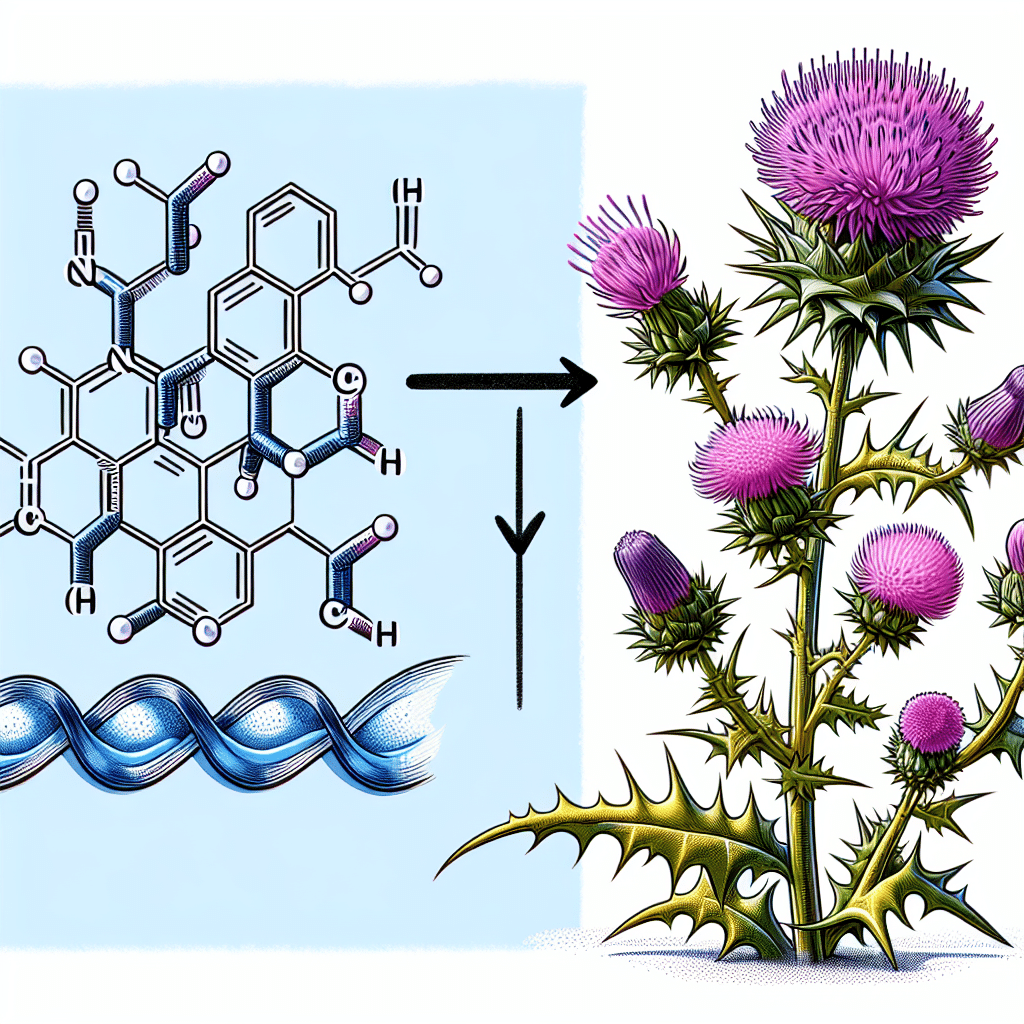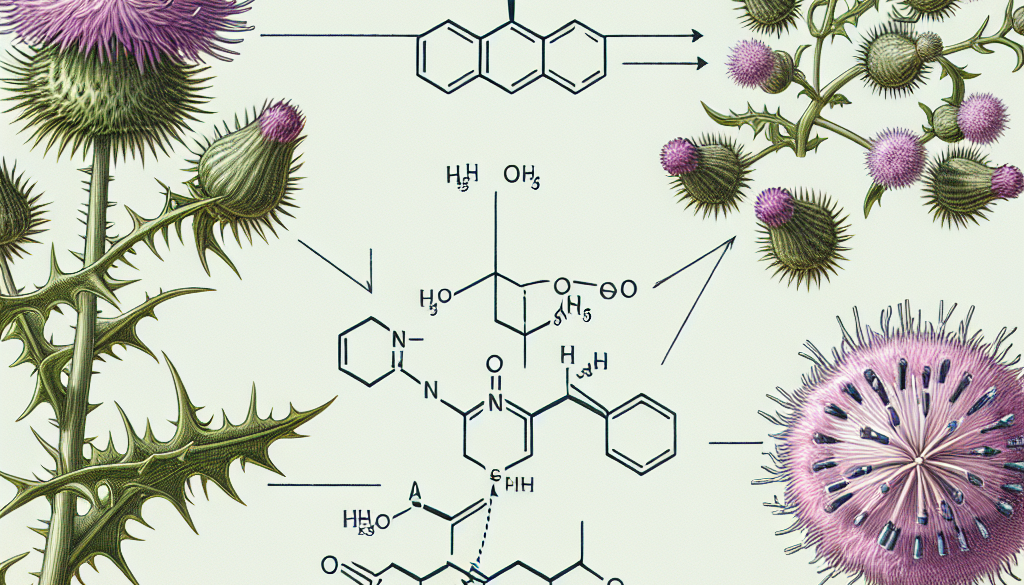Is Silymarin the Same as Milk Thistle?
-
Table of Contents
- Silymarin and Milk Thistle: Understanding the Connection
- What is Milk Thistle?
- Defining Silymarin
- Is Silymarin the Same as Milk Thistle?
- Health Benefits of Silymarin and Milk Thistle
- Scientific Evidence and Case Studies
- Usage and Dosage
- Side Effects and Interactions
- Conclusion: Silymarin and Milk Thistle in Perspective
- Discover ETchem’s Protein Products
Silymarin and Milk Thistle: Understanding the Connection

When it comes to herbal remedies, few have garnered as much attention as milk thistle and its active component, silymarin. Often used interchangeably in conversation, these terms actually refer to different aspects of the same plant. This article will delve into the relationship between silymarin and milk thistle, exploring their uses, benefits, and the scientific evidence supporting their health claims.
What is Milk Thistle?
Milk thistle, scientifically known as Silybum marianum, is a flowering plant native to Mediterranean countries. It has been used for over 2,000 years as a natural remedy for various ailments, particularly liver problems. The plant is easily recognizable by its purple flowers and white-veined leaves, which, according to legend, were caused by a drop of the Virgin Mary’s milk falling onto its leaves.
Defining Silymarin
Silymarin is a complex of flavonolignans extracted from the seeds of the milk thistle plant. This complex includes several components, such as silybin, silydianin, and silychristin, with silybin being the most active and abundant. Silymarin is the component credited with the therapeutic properties of milk thistle, particularly its hepatoprotective effects.
Is Silymarin the Same as Milk Thistle?
While silymarin is derived from milk thistle, it is not the same as the whole plant. Silymarin is a specific extract that contains a high concentration of the plant’s active compounds. In contrast, milk thistle can refer to the entire plant, including its seeds, leaves, and flowers, which contain a broader range of substances, albeit in lower concentrations than the extracted silymarin.
Health Benefits of Silymarin and Milk Thistle
Both silymarin and milk thistle have been associated with a variety of health benefits, primarily related to liver health. Here are some of the most well-researched benefits:
- Liver Protection: Silymarin is best known for its liver-protective effects. It has been shown to help regenerate liver cells and protect them from toxic substances.
- Antioxidant Activity: Silymarin acts as an antioxidant, scavenging harmful free radicals and reducing oxidative stress.
- Anti-inflammatory Properties: It may help reduce inflammation, which is beneficial for liver health and other inflammatory conditions.
- Support for Liver Conditions: Some studies suggest that milk thistle and silymarin may be beneficial for individuals with liver diseases such as cirrhosis, jaundice, hepatitis, and gallbladder disorders.
Scientific Evidence and Case Studies
Research on silymarin and milk thistle has provided mixed results, with some studies showing significant benefits and others indicating minimal effects. For instance, a meta-analysis published in the “World Journal of Hepatology” found that silymarin had a positive effect on liver enzymes in patients with alcoholic liver disease. However, other studies have called for more rigorous research to conclusively determine the efficacy of silymarin in treating liver conditions.
Case studies have also highlighted individual instances where silymarin or milk thistle supplementation appeared to aid in recovery from liver damage due to toxins or medications. However, these anecdotal reports do not substitute for well-designed clinical trials.
Usage and Dosage
The dosage of silymarin or milk thistle can vary depending on the form of the supplement and the condition being treated. Standardized extracts are typically used in research, with silymarin content ranging from 70% to 80%. It’s essential to follow the manufacturer’s instructions or consult with a healthcare provider for proper dosage guidelines.
Side Effects and Interactions
Both silymarin and milk thistle are generally considered safe when taken in recommended doses. However, they can cause gastrointestinal upset, allergic reactions, or interact with certain medications. As with any supplement, it’s crucial to discuss its use with a healthcare professional, especially for those with pre-existing medical conditions or those taking other medications.
Conclusion: Silymarin and Milk Thistle in Perspective
In conclusion, while silymarin is a component of milk thistle, they are not one and the same. Silymarin is the active extract responsible for most of the plant’s health benefits, particularly those related to liver health. Both have been used historically as herbal remedies, and modern science continues to explore their potential. When considering their use, it’s important to understand the differences, potential benefits, and safety considerations.
Discover ETchem’s Protein Products
If you’re interested in natural health supplements, consider exploring ETchem’s range of protein products. ETchem is a reputable manufacturer and supplier of high-quality collagens, including marine, fish, bovine, chicken, and various types of collagen. Their products are known for their neutral taste and instant solubility, making them an excellent choice for various industries.
ETchem’s specialization in exporting and delivering tailor-made collagen powder and finished collagen nutritional supplements ensures that you have access to comprehensive protein solutions for your health and wellness needs. With a reputation for quality and reliability, ETchem is a trusted partner for global food and beverage brands and Fortune 500 companies.
About ETChem:
ETChem, a reputable Chinese Collagen factory manufacturer and supplier, is renowned for producing, stocking, exporting, and delivering the highest quality collagens. They include marine collagen, fish collagen, bovine collagen, chicken collagen, type I collagen, type II collagen and type III collagen etc. Their offerings, characterized by a neutral taste, instant solubility attributes, cater to a diverse range of industries. They serve nutraceutical, pharmaceutical, cosmeceutical, veterinary, as well as food and beverage finished product distributors, traders, and manufacturers across Europe, USA, Canada, Australia, Thailand, Japan, Korea, Brazil, and Chile, among others.
ETChem specialization includes exporting and delivering tailor-made collagen powder and finished collagen nutritional supplements. Their extensive product range covers sectors like Food and Beverage, Sports Nutrition, Weight Management, Dietary Supplements, Health and Wellness Products, ensuring comprehensive solutions to meet all your protein needs.
As a trusted company by leading global food and beverage brands and Fortune 500 companies, ETChem reinforces China’s reputation in the global arena. For more information or to sample their products, please contact them and email karen(at)et-chem.com today.




